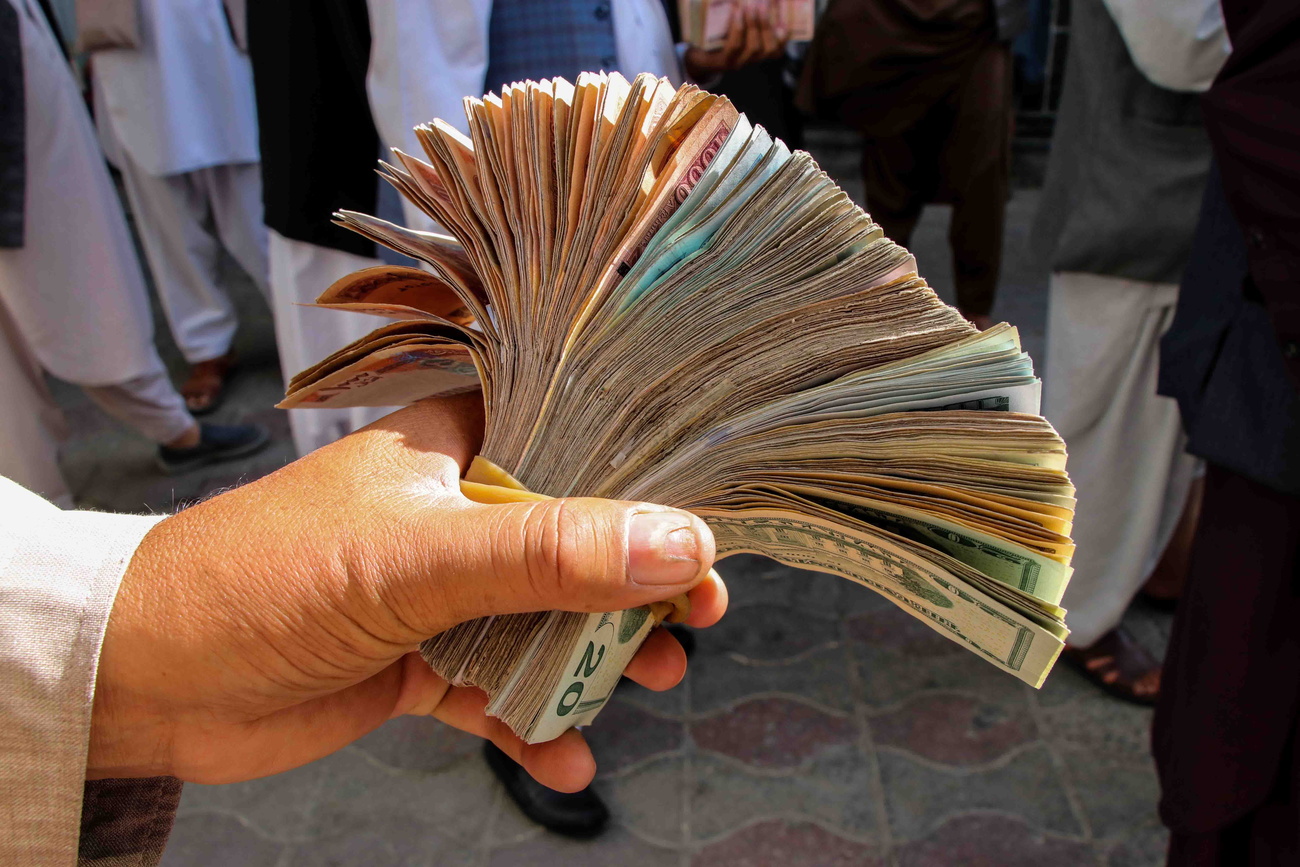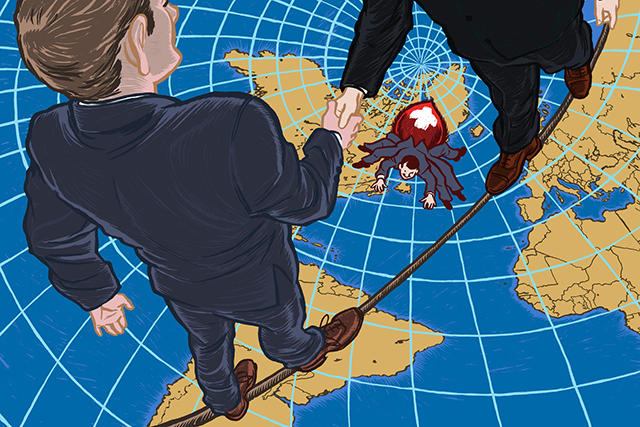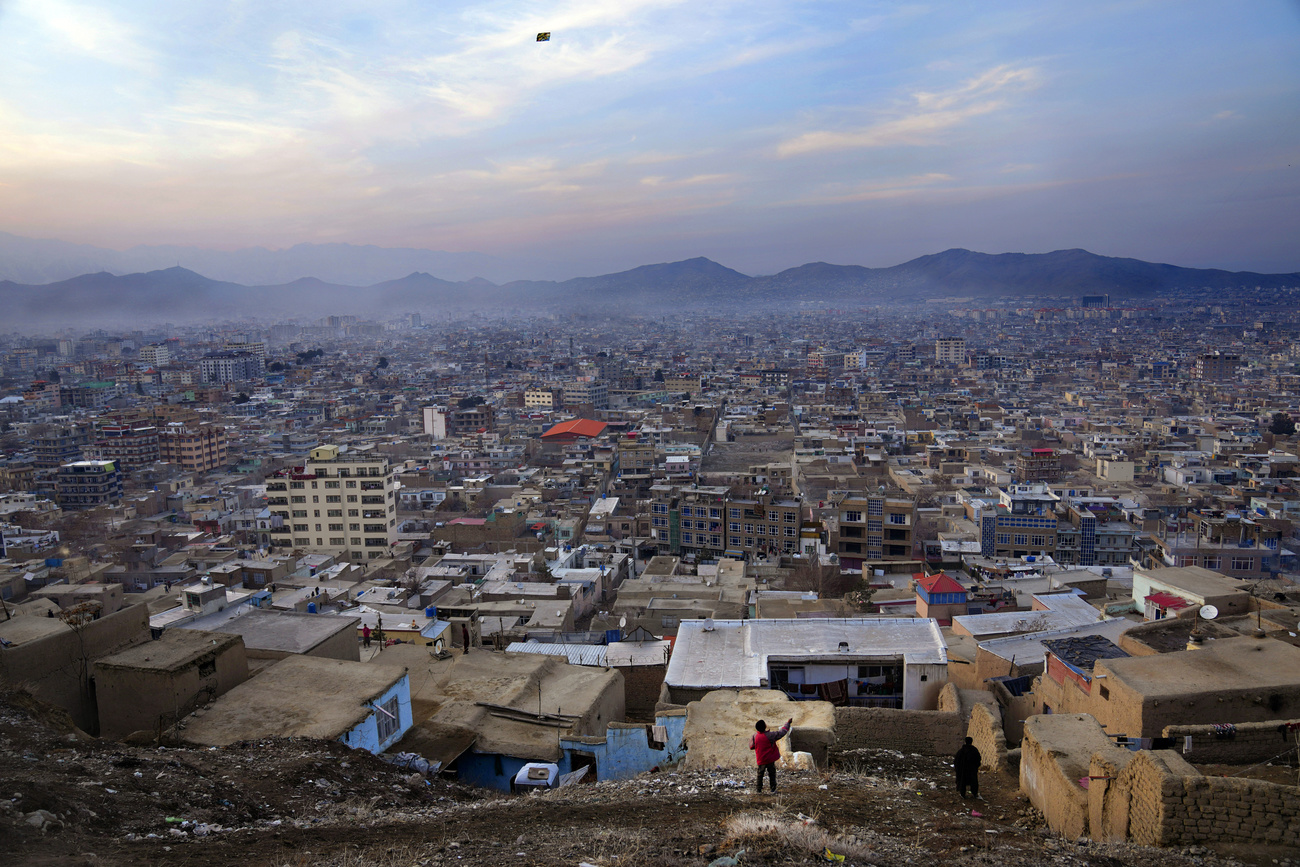
How a portion of Afghanistan’s foreign reserves ended up in Geneva

This is the tale of how $3.5 billion belonging to the Afghan people dodged lawsuits and the Taliban to land in a trust fund in Switzerland – and what happens now to this money.
When a regime goes rogue, the international community can respond with any number of economic sanctions. Freezing foreign reserves is one of them. Afghanistan suffered this very fate soon after the Taliban seized power in August 2021: its roughly $9 billion (CHF9 billion) in foreign assets were frozen in the United States, Europe and the United Arab Emirates.
Since then, the US had been under pressure to return the roughly $7 billion being held at the New York Federal Reserve Bank to Da Afghanistan Bank (DAB), the Afghan central bank. Several prominent international economistsExternal link, including Nobel laureate Joseph Stiglitz, even wrote to President Joe Biden, asking that his administration release the money to help the struggling Afghan economy.
“Freezing central bank reserves is something relatively common, but this case is unique in many ways,” says Alexandra Baumann, head of the Prosperity and Durability Division at the Swiss foreign ministry. “We are looking at an absolutely desperate economic situation [plus] there is no legitimate government in Afghanistan.” Among the crises facing the country are decades of war, years-long drought, and Taliban restrictions on the population, including on women’s right to work.
The US faced a complex foreign policy conundrum: how to help the Afghan people by giving them access to these funds, without a single dollar landing in the hands of the Taliban, who wanted the money turned over to the DAB. The militant group is subject to US sanctions and has failed to be recognised as Afghanistan’s legitimate government.
The US also had to make sure that all $7 billion did not become tangled in civil suits brought by victims of the September 11, 2001 terror attacks – another factor that complicated matters for Washington.
So the US turned to an independent third party – Switzerland – to strike a unique arrangement. Now half of these reserves are being transferred to a foundation in Geneva, the Fund for the Afghan People, which will disburse some of this money to promote macroeconomic stability in Afghanistan.
‘A big dilemma’ for the US
The genesis for the fund came in February, months after the reserves were first frozen by the US treasury department. Biden took the unusual step of signing an executive order in which he declared a national emergency over the “widespread humanitarian crisis” and economic turmoil in Afghanistan, which posed a threat to US security. His administration then asked a judge to allow it to move half of the reserves to a trust fund to support the Afghan people – a permission that was granted and went unchallenged in court.
The other half is subject to ongoing lawsuits filed by victims of the 9/11 attacks and their relatives. A summary judgement in 2012 found the Taliban and other defendants liable to damages of $6 billion, plus accumulated interest, for the attacks.
“After the DAB reserves were frozen, the lawyers for some 9/11 families almost immediately sought to get access to these funds [to pay for these damages],” says William Byrd, an expert on Afghanistan at the United States Institute of Peace. “This posed a big dilemma for the US government.”
The US Department of Justice has since argued that these damages should be cut by more than half, as legally they are meant to be compensatory rather than punitive in nature. Yet putting aside even just part of the reserves to settle these claims, which are still pending in the courts, has proved controversial. Experts say there is no evidence the Taliban took part in the attacks. It is also not clear if the Taliban – or the claimants – are entitled to the DAB funds.
“US law says that the central bank reserves of a country that for whatever reason, has an unrecognised government, don’t belong to that government,” Byrd explains.
Given these complexities, setting up a trust fund was the solution the US could come up with, says Byrd. The US approached Switzerland for help to make it a reality. Months of discussions and legal consultations on the US and Swiss sides led to the creation of the Geneva foundation in September.
Having the money in an account in Switzerland makes it “much less vulnerable to litigation in the US, and that’s a major accomplishment,” says Byrd.
Swiss expertise and credibility
Baumann says that while she cannot think of a precedent for the fund in this exact form, Switzerland had the type of expertise the Americans were looking for.
“The US asked Switzerland because we have experience finding innovative arrangements in difficult diplomatic and financial situations,” says Baumann, who gives as an example the humanitarian trade arrangement, a payment mechanism created by the Swiss two years ago to allow aid to be delivered to Iran without breaching US sanctions.

More
Need a diplomatic messenger? Switzerland is eager to help
“It’s good that Switzerland stepped in, as it’s not clear that anybody else would have been able – with credibility – to take on [the Afghan fund],” says Byrd.
The Taliban called the decision to set up the Geneva fund “unacceptable” and a violation of international norms. According to both Washington and Bern, in addition to disbursing some of the money to support the Afghan economy, the foundation intends to preserve the assets so they can one day be returned to the DAB – but only once the institution is free of Taliban influence and has adequate anti-money laundering measures in place. Two top DAB officials appointed by the Taliban are subject to international sanctions.
“The DAB in its current form is not a fit place for this money,” says Baumann. “We do not have any guarantee that if the money goes back right now that it will be effectively used for the benefit of the Afghan people.”
Baumann will sit on the new fund’s board of trustees as the Swiss representative, alongside two Afghan nationals with experience working for the DAB and the US ambassador to Switzerland, Scott Miller. The board will have the power to decide how to disburse the reserves.
“We will work to make sure that the foundation takes an inclusive approach – that it does what the Afghan people want because it’s their money,” says Baumann when asked what Switzerland’s priorities will be. “Switzerland has no particular self-interest in this fund except to help the population.”
Small disbursements expected
The board will meet in the coming weeks and Switzerland hopes initial ideas for disbursements will be announced before the end of the year. Since the fund intends to support macroeconomic and financial stability in Afghanistan, the money will not be used to finance international humanitarian aid – a criterion that was underlined by the Afghan experts the Swiss and Americans consulted, says Baumann.
The foundation set up in Geneva will have an account at the Bank for International Settlements (BIS) in Basel. The board of trustees will decide by consensus on the specific use of the $3.5 billion in funds “in the best interests of the Afghan people”. It will also ensure that the money does not benefit the Taliban.
The four-member board is comprised of the US ambassador to Switzerland, Scott Miller, who is also board president; Alexandra Baumann, an ambassador with the Swiss foreign ministry; Anwar ul-Haq Ahady, a former governor of Da Afghanistan Bank (DAB); and Shah Mohammad Mehrabi, a member of the board of the DAB. Ahady and Mehrabi are also co-founders of the foundation. The board is free to consult anyone and appoint an advisory committee on which Afghan voices can be represented. All its decisions will be made public.
The more than $9 billion in foreign reserves belonging to Afghanistan is equivalent to almost half of its GDP, or more than a year of imports, according to William Byrd of the United States Institute of Peace.
The disbursements are expected to be relatively small. It’s the right strategy, says Byrd, as spending a huge chunk in the short run would be “a quick fix and would leave the country no better off.”
For example, the reserves could be used as leverage to help international economic relations, Byrd says, pointing out that it has been difficult to get trade financing for even basic goods to enter Afghanistan.
Another practical use could be to finance the printing of new Afghan bank notes for daily transactions. The notes currently in circulation are falling apart, says Baumann.
“That’s a basic task of any central bank and right now the DAB is not in a position to do that,” she says.
If the fund proves successful, countries that are holding the remainder of the frozen Afghan reserves – roughly $2 billion – could decide to pour that money into the Geneva foundation, Byrd believes.
What the fund will not do is solve all of Afghanistan’s woes. The country had to absorb a huge economic shock following the Taliban takeover, says Byrd, and “nothing would ease it greatly given the magnitude of the foreign aid cut-off”. Many donor countries withdrew their funds in the aftermath of the takeover.
The humanitarian crisis is so critical that the UN launched its single biggest country aid appeal for Afghanistan, to the tune of $4.4 billion, for 2022. It’s a goal Baumann says the international community would be hard pressed to meet year after year.
“The foundation is a patch – it will not replace the DAB,” Baumann concedes. “But it’s worthwhile to try and at least use parts of the reserves to alleviate the immediate economic stress currently on Afghanistan.”
Edited by Virginie Mangin

More
Switzerland again beefs up aid to Afghanistan

In compliance with the JTI standards
More: SWI swissinfo.ch certified by the Journalism Trust Initiative
































You can find an overview of ongoing debates with our journalists here . Please join us!
If you want to start a conversation about a topic raised in this article or want to report factual errors, email us at english@swissinfo.ch.